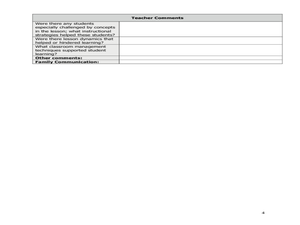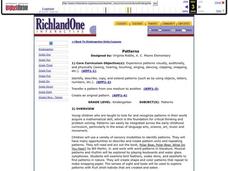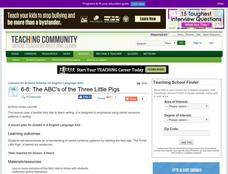Dick Blick Art Materials
Mehndi Art Gloves
Class members get a chance to practice the art of Mehndi as they use markets to apply patterns to a latex glove.
Curated OER
SIGHT READING RHYTHM PATTERNS
The perception of rhythms by reading and the ability to auditorily discriminate these rhythm patterns by listening to them performed by the teacher is practiced here. your students will work to create an eight-beat long rhythm pattern.
Sargent Art
Destination Art: Paper Mola Collage
The Kuna Indians hail from the San Blas Island near Panama. Learners will investigate their culture by creating paper mola collages, just like the ones created by the indigenous Panamanians. They'll focus on understanding the symbolism...
Curated OER
It Just Keeps Going and Going...
Students explore patterns, identify patterns, and complete a variety of patterns. They view and discuss an online video and identify the different patterns from the film, then using a hundreds grid create an original pattern using their...
Curated OER
Tessellations: Geometric Patterns
Students create tessellation drawings using repeating geometric shapes.
Curated OER
Symmetry in Relief
Students explore radial symmetry. In this 3 dimensional art and geometry lesson, students identify examples of radial symmetry in everyday objects. Students create an imprint using radial symmetry on clay tiles.
Curated OER
Bugs Take Shape
Students investigate butterflies, moths, ladybugs and spiders looking at shapes, colors and patterns. They create a three dimensional bug using Crayola Model Magic, repeating patterns found in nature. They cut and shape the dough using...
Dick Blick Art Materials
Start with a Circle...
The Golden Ratio. The Divine Proportion. Yup. It's math and art blended into one colorful activity. Young artists combine colored tissue paper circles and parts of circles to create geometric patterns. As a bonus, kids get to figure out...
Curated OER
RHYTHMIC PATTERNS
Students explore rhythmic patterns. They create and perform the rhythms and use Cubase software to perform, record, and play rhythms for use in dictation exercises. They identify and count rhythm patterns
Curated OER
Studio Art Lessons Based on Latin American Arts
Study three of the basic principles of design: l) designs should create a rhythmic pattern made up of related shapes, 2) colors should be repeated so as to not force the eye to remain with a single part of the composition, and 3) a...
Curated OER
Painting Package
Students use tools in a painting package to design tiles and create repeating patterns. They design a single tile using a 4 x 4 grid and experiment with changing the alignment of some of the tiles by rotating different areas.
Education Closet
Equal Rhythms
Engage young mathematicians in learning about fractions with this cross-curricular math and music instructional activity. After listening to and repeating different beat patterns, children realize that musical notes are just another way...
Curated OER
Patterns
Students create and extend patterns. In this pattern lesson plan, students learn to identify patterns using multiple senses. Students work at centers in small groups to explore and extend their understanding of patterns.
Curated OER
Phonics Instructional Routine: Read and Write Words with Consonant Digraphs
Use consonant digraphs to introduce learners to word patterns and high frequency words. They observe a chart with the digraphs /sh/, /ch/, /th/, and /wh/. After listening to each of these phonemes, scholars watch as the teacher...
Curated OER
WonderFoam Collagraph Prints
Experiment with your very own printmaking blocks using foam sheets! Your class can create a beautiful pattern on their stamp with various shapes, symmetrical or not. Printing these might resemble Italian or Spanish tile patterns, or a...
Classics for Kids
"Mars" from The Planets
Gustav Holst's The Planets provide young musicians an opportunity to examine how composers can create a suite: a collection of smaller pieces grouped to explore a single topic. After listening to "Jupiter," they examine "Mars" in detail,...
Curated OER
The ABC's of the Three Little Pigs
Writers use varied sentence patterns. They listen to the story of Cinderella rewritten so that each sentence starts with the next letter of the alphabet. They create their own version of The Three Little Pigs using the same concept.
Curated OER
Family Quilts Keep us Warm
Learners explore families and culture. In this family and culture instructional activity, students discuss their families and their similarities and differences. Learners read the book The Keeping Quilt by Patricia Polacco and create...
Curated OER
Art of Japan - Textiles - Kimonos
Students examine and discuss the role of the Kimono in Japanese culture. They create Kimono Paper Weavings, Kimono Scratch Art, and Kimono Clay Sculptures.
Curated OER
Frieze Design in Indigenous Art
Students describe Frieze designs using the work of indigenous people. In this math lesson, students create 7 frieze designs using different patterns. They create one row of repeated art and repeat this 7 times over to show examples of...
Curated OER
Shapes in Art, Shapes in Body
Students explore body movement. In this shapes and dance instructional activity, students demonstrate body movements and positions that resemble simple shapes. Students read I Spy Shapes in Art by Lucy Micklethwait and choose shapes...
Curated OER
Whose History Is It Anyway? Patterns in History
Read and examine primary source material in order to analyze, synthesize, and debate information about the Great Depression. Critical analysts research various source materials related to the Great Depression. They work in teams to...
Curated OER
Mouse Mess
Scholars practice rhyming and phonemic awareness using trade books and poetry. They will listen to the book Mouse Mess several times throughout the week, identifying rhyming words, and matching words that begin with the same sound. Then...
Hawaiʻi State Department of Education
Fuzzy Wuzzy
You don't need drums to play percussion; you can use your own body. Second graders use body percussion to make four-beat rhythms and play patterned clapping games. When they are finished they discuss beats, patterns, rhythm, and rhyme.

























